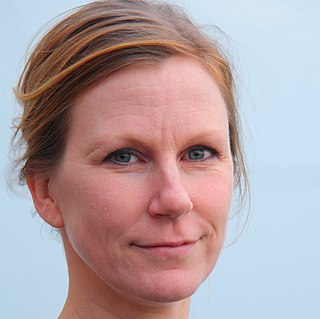
Social science is one of the branches of science, devoted to the study of societies and the relationships among individuals within those societies. The term was formerly used to refer to the field of sociology, the original "science of society", established in the 19th century. In addition to sociology, it now encompasses a wide array of academic disciplines, including anthropology, archaeology, economics, human geography, linguistics, management science, communication science and political science.

A meta-analysis is a statistical analysis that combines the results of multiple scientific studies. Meta-analyses can be performed when there are multiple scientific studies addressing the same question, with each individual study reporting measurements that are expected to have some degree of error. The aim then is to use approaches from statistics to derive a pooled estimate closest to the unknown common truth based on how this error is perceived. Meta-analytic results are considered the most trustworthy source of evidence by the evidence-based medicine literature.
Social statistics is the use of statistical measurement systems to study human behavior in a social environment. This can be accomplished through polling a group of people, evaluating a subset of data obtained about a group of people, or by observation and statistical analysis of a set of data that relates to people and their behaviors.

Quantitative research is a research strategy that focuses on quantifying the collection and analysis of data. It is formed from a deductive approach where emphasis is placed on the testing of theory, shaped by empiricist and positivist philosophies.

In sociology, social complexity is a conceptual framework used in the analysis of society. In the sciences, contemporary definitions of complexity are found in systems theory, wherein the phenomenon being studied has many parts and many possible arrangements of the parts; simultaneously, what is complex and what is simple are relative and change in time.

A systematic review is a scholarly synthesis of the evidence on a clearly presented topic using critical methods to identify, define and assess research on the topic. A systematic review extracts and interprets data from published studies on the topic, then analyzes, describes, and summarizes interpretations into a refined conclusion. For example, a systematic review of randomized controlled trials is a way of summarizing and implementing evidence-based medicine.

Tom A. B. Snijders is professor of Statistics in the Social Sciences at Nuffield College, Oxford, one of the constituent colleges of the University of Oxford. He is also professor of Methodology at the University of Groningen, a position he has held for more than twenty years.

Cretien van Campen is a Dutch author, editor and scientific researcher in social science and fine arts. He is the founder of Synesthetics Netherlands and is affiliated with the Netherlands Institute for Social Research | SCP. He is best known for his work on synesthesia and studies of quality of life.
Dorothea Jacqueline (Dorien) DeTombe is a Dutch sociologist and former academic at the Utrecht University and the Delft University of Technology, known for her contributions in the field of methodology for societal complexity.
One application of multilevel modeling (MLM) is the analysis of repeated measures data. Multilevel modeling for repeated measures data is most often discussed in the context of modeling change over time ; however, it may also be used for repeated measures data in which time is not a factor.
Johannes "Hans" van der Zouwen is a Dutch sociologist, and Emeritus Professor of Social Research Methodology at the Vrije Universiteit in Amsterdam, known for his pioneering work with Felix Geyer in the field of sociocybernetics.
Willem Egbert (Wim) Saris is a Dutch sociologist and Emeritus Professor of Statistics and Methodology, especially known for his work on "Causal modelling in non-experimental research" and measurement errors.

Edith Desiree de Leeuw is a Dutch psychologist, statistician, research methodologist, and professor in survey methodology and survey quality, at the University of Utrecht. She is known for her work in the field of survey research.
Jörg Blasius is a German sociologist, and Professor at the Institute of Political Science and Sociology of the University of Bonn. He became known through his earlier work on correspondence analysis in the social sciences.
Cornelis Johannes (Cor) van Dijkum is a Dutch sociologist, consultant and academic at the Utrecht University, known for his contributions in the field of methodology for complex societal problems.
Daniel John Bauer is an American statistician, professor, and director of the quantitative psychology program at the University of North Carolina, where he is also on the faculty at the Center for Developmental Science. He is known for rigorous methodological work on latent variable models and is a proponent of integrative data analysis, a meta-analytic technique that pools raw data across multiple independent studies.

Kelvyn Jones, is a British professor (Emeritus) of human quantitative geography at the University of Bristol. He focuses on the quantitative modelling of social science data with complex structure through the application of multilevel models; especially in relation to change and health outcomes. Uniquely he is an elected Fellow of the British Academy, the Academy of the Social Sciences and the Learned Society of Wales.
Fiona Alison Steele, is a British statistician. Since 2013, she has been Professor of Statistics at the London School of Economics (LSE).

Ellen Louise "E.L." Hamaker is a Dutch-American psychologist, and statistician. Since 2018 she has been a full professor at Utrecht University, holding the chair Longitudinal Data Analysis at the Department of Methodology and Statistics. Her work focuses on the development of statistical models for the analysis of intensive longitudinal data in psychology, mainly within the frameworks of structural equation modeling and time series analysis.
Hendrik (Henk) Koppelaar is a Dutch computer scientist and emeritus professor at the Delft University of Technology, knows for his work in knowledge engineering.









